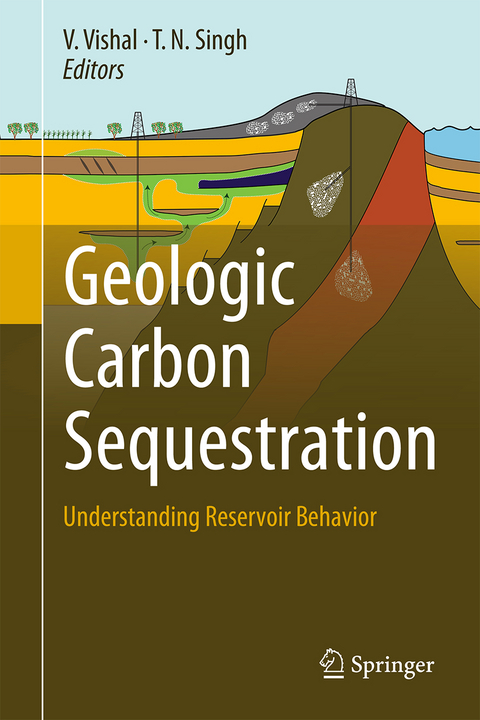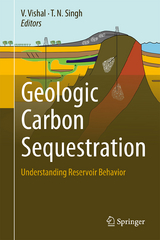Geologic Carbon Sequestration
Springer International Publishing (Verlag)
978-3-319-27017-3 (ISBN)
This exclusive compilation written by eminent experts from more than ten countries, outlines the processes and methods for geologic sequestration in different sinks. It discusses and highlights the details of individual storage types, including recent advances in the science and technology of carbon storage. The topic is of immense interest to geoscientists, reservoir engineers, environmentalists and researchers from the scientific and industrial communities working on the methodologies for carbon dioxide storage.
Increasing concentrations of anthropogenic carbon dioxide in the atmosphere are often held responsible for the rising temperature of the globe. Geologic sequestration prevents atmospheric release of the waste greenhouse gases by storing them underground for geologically significant periods of time. The book addresses the need for an understanding of carbon reservoir characteristics and behavior. Other book volumes on carbon capture, utilization and storage (CCUS) attempt to cover the entire process of CCUS, but the topic of geologic sequestration is not discussed in detail. This book focuses on the recent trends and up-to-date information on different storage rock types, ranging from deep saline aquifers to coal to basaltic formations.Vikram Vishal is an Assistant Professor in the Department of Earth Sciences, Indian Institute of Technology (IIT) Bombay, Mumbai, India. He worked in the Department of Earth Sciences, IIT Roorkee as DST Inspire Faculty and at the Department of Energy Resources Engineering, Stanford University (USA) as a Fulbright-Nehru Postdoctoral fellow during 2013-15. He obtained a Ph.D. degree jointly from IIT Bombay (India) and Monash University (Australia). He is a recipient of the National Geosciences Award and Young Researcher by the Government of India, the Young Scientist Award by the Indian Science Congress Association, and Dr. Coggin Brown Memorial Award from the Mining, Geological and Metallurgical Institute of India, Kolkata. He holds to his credit a total of 42 publications on different domains of carbon sequestration, engineering geology, geomechanics and unconventional petrophysics in various journals, book chapters and conference proceedings of repute. He is investigating three research projects funded by the Ministry of Science and Technology by the Govt. of India. Trilok Nath Singh is the Institute Geoscience Chair Professor in the Department of Earth Sciences, IIT Bombay, Mumbai and is an expert in the field of rock mechanics, mining geology and clean energy. He received Ph.D. degree from the Institute of Technology BHU, Varanasi in 1991 and subsequently served the institute until 2003. He is a recipient of many prestigious awards such as the National Mineral Award, the first P. N. Bose Mineral Award, the SEAGATE Excellence Award for Geo-Engineering and the GSI Sesquicentennial Commemorative Award. He has nearly 28 years of experience in research and teaching with 16 doctoral theses completed under his supervision and has authored more than 350 publications in various journals and conferences of national and international repute. He is currently leading projects of immense scientific and industrial importance related to coalbed methane, carbon sequestration, shale gas, nuclear waste repositories, and mine slope stability, to name a few. He is on the governing and advisory councils of several national institutes and universities.
1. Carbon capture, transport and geologic storage: A brief introduction.- 2. Algorithms for CO2 storage capacity estimation: Review and Case study.- 3. Trapping mechanism of CO2 storage in deep saline aquifers: brief review.- 4. Monitoring of CO2 plume migration in deep saline formations with kinetic interface sensitive tracers (A numerical modelling study for the laboratory).- 5. Monitoring of soil gases in the characterization stage of CO2 storage in saline aquifers and possible effects of CO2 leakages in the groundwater system.- 6. CO2 storage capacity estimates for a Norwegian and a Swedish aquifer using different approaches - from theoretical volumes, basin modelling to reservoir models.- 7. Determination of CO2-brine-rock interactions for carbon dioxide sequestration using SEM-EDS methods.- 8. Geological Considerations for CO2 Storage in Coal.- 9. A review summary on multiple aspects of coal seam sequestration.- 10. CO2 Storage in Depleted/Producing Oil reservoirs.- 11.Mineral Carbonation in Ultramafic and Basaltic Rocks.- 12. Ocean Applications for Carbon Dioxide Sequestration.- 13. Risk Assessment of the Geological Storage of CO2: A Review.- 14. Numerical modelling of CO2 gas injection with hydrate formation: A Case Study in the Laboratory-Scale Sand Sediment.- 15. Security Assessment on Geological Storage of CO2: Application to Hontomin Site.
| Erscheinungsdatum | 09.05.2016 |
|---|---|
| Zusatzinfo | XI, 338 p. 108 illus., 69 illus. in color. |
| Verlagsort | Cham |
| Sprache | englisch |
| Maße | 155 x 235 mm |
| Themenwelt | Naturwissenschaften ► Biologie ► Ökologie / Naturschutz |
| Naturwissenschaften ► Geowissenschaften ► Geologie | |
| Technik ► Elektrotechnik / Energietechnik | |
| Schlagworte | Carbon Reservoir Characterization • Climate Change/Climate Change Impacts • Climate change impacts • Climate Change Mitigation and Geological Carbon St • Climate Change Mitigation and Geological Carbon Storage • CO2 Reservoirs • CO2 sequestration • CO2 storage • Coal and Climate Change • Deep Saline Aquifers • Earth and Environmental Science • Fossil Fuels (incl. Carbon Capture) • Geo-engineering and Rock-fluid Interactions • Geological Carbon Storage • Geotechnical Engineering & Applied Earth Sciences • Geotechnical Engineering & Applied Earth Sciences • Igneous Rocks and CO2 Storage • Oil and Gas Reservoirs • Risk Assessment in Carbon Sequestration |
| ISBN-10 | 3-319-27017-6 / 3319270176 |
| ISBN-13 | 978-3-319-27017-3 / 9783319270173 |
| Zustand | Neuware |
| Haben Sie eine Frage zum Produkt? |
aus dem Bereich




